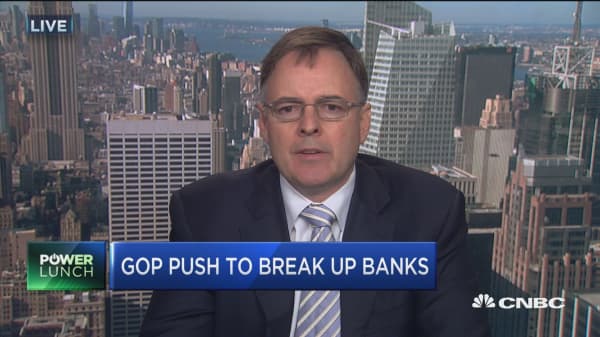Other major actors in the lead up to the crisis were other non-banks, like Fannie Mae, Freddie Mac, and AIG.
In short, none of the institutions at the heart of the crisis were impacted by Glass-Steagall's repeal. Even Senator Elizabeth Warren has admitted as much.
It's not a coincidence that the big crisis-era failures were at monoline institutions. Diversification actually enabled our largest banks to survive better, and eventually take steps that helped to stabilize the rest of the financial system. Nevermind the benefits to customers served by universal banks.
It's also really dumb politics, a desperate lurch toward the populism of the far left. The Trump camp is under the delusion that it can attract Bernie Sanders voters by cribbing one of his marquee policies. (A policy, it should be noted, that failed to win Sanders the Democratic nomination.)
It's completely laughable to think Sanders/Warren supporters might wake up one morning and say, "We'll forgive his misogyny, his hatred of immigrants, his race-baiting, his trampling on the first amendment and support Trump because he pretends to take a whack at Wall Street."
In case any Sanders voters get wandering eyes, Elizabeth Warren — the godmother of anti-Wall Street policies — has taken it upon herself to remind Sanders voters that Trump is no friend. Trump can't out-Warren Warren.
Trump's careening tour through populism also worries already suspicious free-market Republicans, giving them yet another reason to stand on the sidelines. It only reinforces the fear that support for Trump buys you a ticket on the crazy train, not knowing where the next wild policy lurch will land them.
The willingness of rank-and-file Republicans to abandon any sense of principle in order to placate Trump is a mistake, and it will have long-term consequences. Fortunately, serious economic policy makers within the Republican Party have not endorsed the reinstatement of Glass-Steagall. House Speaker Paul Ryan's economic-reform plan declined to include Glass-Steagall, while only three Republican members of Congress have signed onto either the House or Senate version of Sen. Warren's legislation.
A Republican Party that favors populist solutions to economic problems will continue to flounder.
Commentary by Tony Fratto, managing partner at Hamilton Place Strategies, a strategic communications and crisis management consultancy based in Washington, DC, that does work for large financial institutions, among other sectors. Prior to that, he was deputy assistant to the president and deputy press secretary to President George W. Bush from September 2006 to January 2009. Follow him on Twitter @TonyFratto.
For more insight from CNBC contributors, follow
@CNBCopinion
on Twitter.



